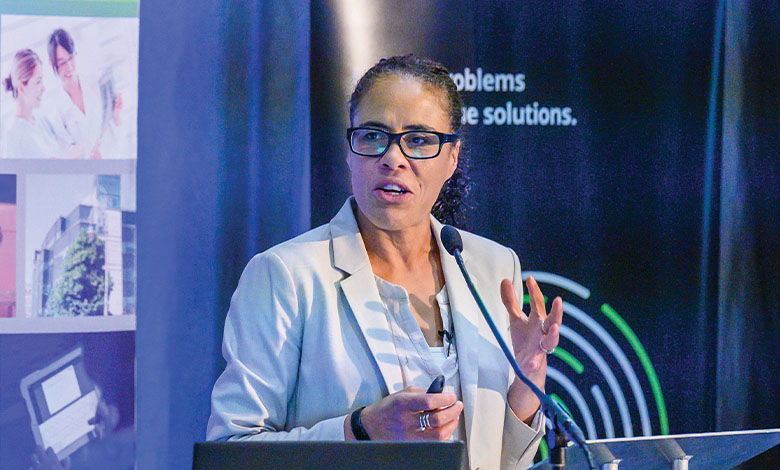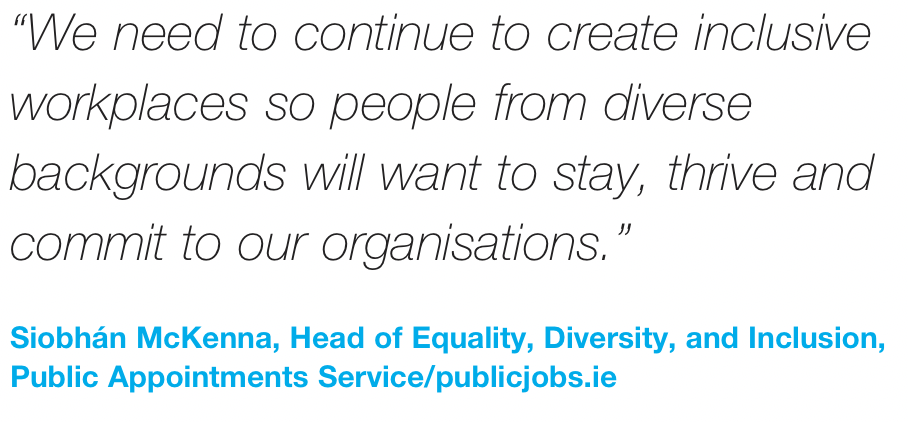Equality, diversity, and inclusion in the public service

Head of Equality, Diversity, and Inclusion (EDI) at the Public Appointments Service/ publicjobs.ie – the centralised recruiter for the civil and public sector – Siobhán McKenna, highlights challenges in ensuring public sector workplaces are equitable and inclusive and how embedding EDI will help shape the workforce of the future.
With the size of the public sector workforce growing annually at a rate of 3.6 per cent since 2014, projected figures for total people employed in the civil service by 2031 are approximately 70,0001. In this context, McKenna suggests that the civil service must embrace EDI as a key driver in shaping both the workplace and workforce of the future.
The Randstad Workmonitor 2023 report identifies the five key priorities of the current global workforce when seeking employment:
- job security;
- work life balance;
- values;
- flexibility; and
- purpose, meaning and belonging.
Equality, diversity, and inclusion
McKenna believes that the workforce of the future is becoming more values driven. “Whether it is due to social movements such as #MeToo and Black Lives Matter, or the inequality exposed by the Covid pandemic, we are more focused on our values than ever before,” she explains.
Citing a recent Hayes Ireland Workplace Diversity, Equity and Inclusion Report, McKenna notes that half of people surveyed would only consider applying to an organisation if it had a public commitment to EDI.
“One in two people surveyed by Hayes Ireland indicated that they would consider leaving their current organisation if it did not demonstrate a clear commitment to EDI and only 12 per cent of professionals believe their organisation’s workforce demographic is a fair reflection of today’s society,” she says.
McKenna also highlights that one of the key areas for improvement within the public sector is tackling ethnic or racial discrimination. In general, “people with an ethnic minority background have fewer promotional opportunities than their ethnic majority colleagues, a scenario that is replicated in workforces and sectors across Ireland,” she states.
To enhance EDI, McKenna contends that the public service of the future must be forward-looking, flexible, and fulfilling, while also equipped with new and emerging skillsets.
Suggesting that the workforce of the future will be multi-generational, with a “vastly different approach to work and work-life balance” across those generations, she determines: “The workforce of the future will be looking for inclusive and culturally competent leaders; people who understand the power and value of diversity and how to make it work for the people of Ireland.”

Pursuing EDI
In the Better Public Services: Public Service Transformation 2030 Strategy, under Pillar Two – Workforce and Organisation of the Future, the Government states its commitment to ensuring “a Public Service that is more diverse, agile and inclusive and reflects Irish society, to better serve the Government and the public.”
To support this ongoing effort, the Public Appointments Service/ publicjobs.ie launched its EDI strategy in 2021, outlining three key change areas of focus to ensure inclusive recruitment for all candidates, including:
- getting better data and insights on who is applying for and securing roles in the civil and public sector;
- developing better processes to ensure an equitable recruitment experience for all candidates; and
- influencing and encouraging clients, partners and stakeholders to support inclusive recruitment and more equitable workplaces.
“We commissioned the ESRI to analyse thousands of data sets from application and assignment across gender, disability and ethnicity between 2019 and 2021,” McKenna says, adding that the findings of which reveal low representation of people with an ethnic minority background and those who are disabled.
Underrepresentation of disabled employees
To combat the underrepresentation of candidates with disabilities, the Public Appointments Service has long supported the delivery of Ahead’s well-established Willing Able and Mentoring (WAM) work placement programme. This programme aims to promote access to the labour market for graduates with disabilities. In 2022 a pathway to a permanent job after the placement was developed for the first time. Reflecting on its impact, McKenna outlines: “In 2022, out of a total of 22 work placements, 17 people subsequently secured roles across the service”, confirming for McKenna that different models of recruitment should be encouraged to attract and support the skills required for our future public services.
Furthermore, the Public Appointment Service/publicjobs.ie secured significant funding in 2023 from the Public Service Innovation Fund to take a co-design approach to re-imagining the reasonable accommodations process for candidates with disabilities, focusing on the assignment and onboarding stage.
Project partners, Tilting the Lens, a disability-led consultancy, brought over 100 people, from 30 organisations across the civil and public sector, together to participate in a collaborative design methodology – this included clients, candidates, design experts, disability advocates and unions. Two civil service-wide town halls were convened as part of this project with over 700 employees in attendance.
The Blueprint for Welcoming and Supporting Disabled Employees in the Civil and Public Sector addresses key challenges identified at the assignment and onboarding stages. The blueprint includes nine recommendations (across people and culture, process and systems, and policy and governance) that are designed to help public bodies implement and report on transparent actions to achieve long-term positive change in the assignment and onboarding of candidates with disabilities.
Underrepresentation of employees with a migrant background
In relation to creating opportunities in the public sector for people with migrant background, McKenna highlights that the restrictive immigration eligibility criteria as an ongoing “structural barrier” for this group. “In response,” she continues, “prompted by research we commissioned through Open Doors and Fragomen, an interdepartmental working group reviewed the immigration eligibility criteria with a view to broadening it”. The civil service now accepts Stamp 4 and 5 permissions which McKenna says she hopes will help open the service up to a more diverse talent pool to drive creativity, innovation and productivity in our public services, so that “we deliver for all of Ireland’s communities.”
The Public Appointments Service/ publicjobs.ie also increased engagement with clients, partners, and public policy to enhance equality, diversity, and inclusion in the public sector, through strategic partnerships, external engagement and sponsorship including sponsorship of National Diversity and Inclusion Awards and the Exchange House Traveller Education Achievement Awards.
The leading EDI work of Public Appointments Service/publicjobs.ie has been recognised, with the CIPD inaugural Diversity Champion Award in 2023 and its partnership role a Civil Service Excellent Award for the ground-breaking Oireachtas Work Learning (OWL) Programme in 2023. While in addition the innovative Public Jobs Schools Resource Kit made significant inroads into demystifying careers within the civil service and public service and inspiring students from diverse backgrounds across state secondary schools to consider a public service career.
Summary
Summarising, McKenna insists that the public service must continue to create inclusive workplaces so that people from diverse backgrounds will want to stay, can thrive, and commit to our public sector bodies and services.
“We need better data, we need better processes, and we need to challenge the status quo. And I suspect that if we lead with empathy, we cannot go wrong,” she concludes.





